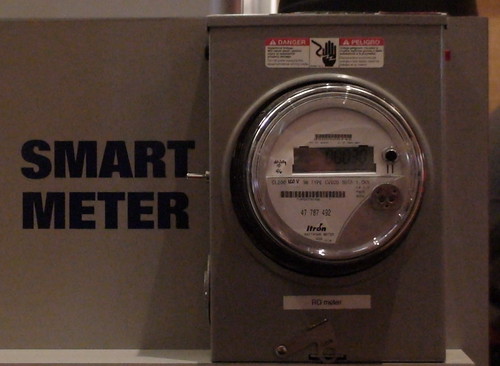
Photo Credit Tom Raftery
I have been talking to a lot of Smart Meter and utility companies in the last few weeks and it has been fascinating. I have learned a huge amount about some of the challenges and opportunities involved in rolling our Smart Grids.
The first thing to say is that Smart Grids are coming. None of the utilities I have spoken to have given me feedback to indicate that they are rolling back on their Smart Grid projects – and they all have Smart Grid projects at some level, whether it is in planning, in trial or in roll out.
One of the questions I have asked and not received a satisfactory answer to yet is “What happens if I decide to change utility co.? Does my existing utility come along, take the Smart Meter off my wall and my new utility then needs to send an engineer to install their Smart Meter?” Unfortunately, so far the answer to this appears to be “Yes”!
In reality, this will probably be solved with some kind of cost or asset transfer solution.
As an electricity consumer (be that industrial or residential), ideally what I want is either an ‘unlocked’ Smart Meter, or one which is owned by the grid management company, as opposed to one which is locked into a particular utilitity.
In fact, for me the ultimate solution would be a neutral Smart Meter which can go out at all times, find the cheapest electricity at that time and pull from that utility!

Maybe sometime in the future, suppliers will become redundant. Our meters will negotiate directly with generators IT via some sort of market mechanism. We could purchase future energy based on our normal usage pattern and purchase spur of the moment electricity at best price. But may not just yet!
Tom, great point and let’s hope that these new devices become consumer appliances and are looked upon as an essential part of a house or office infrastructure. As IP-addressable appliances, naturally they will possess the ability to seek out the best match between spot market price and the local “energy policy” set by the homeowner or business. One company I have been following that looks like they “get” this is Energy Hub (http://www.energyhub.net/Home.html), a small startup that is delivering an appliance which allows consumers to take direct action to reduce their energy usage costs. Cool things start to happen when individual usage information is mashed-up with real-time rate and load information from utilities.
Drew
Sorry… I made a mistake (because of writing too quickly in English, which isn’t my mother tongue):
Nowadays, in Spain, you CAN change utility co. and you don`t need to change de meter.
Indarki,
thanks for stopping by and commenting.
I understand that you can change utility co. in Spain and that you don’t need to change meter but that may change when the utilities here in Spain start to roll out Smart Meters.
The utility co.s need to invest several hundred euros for each meter they roll out. They will want a return on that investment (a bit like the mobile phone companies – if you buy a phone from them, they get you to sign a contract to stay with them for a set period).
With the utilities, if you wish to switch before they have a return on the investment in their smart meter, they may require their meter back (or have agreements with the other meter co.’s to take over the cost of the meter).
The main thing I want to see is a smart meter which is utility neutral and which can go out and find the cheapest utility to pull electricity from at any time of the day so I am constantly minimising my costs!
Yet another way for big brother to monitor and control your life. Welcome to socialism.